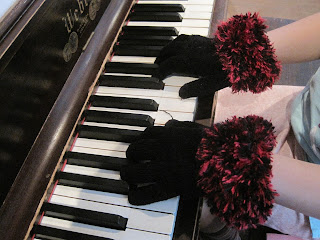The Day The Tones Desired Equality
(The following is a piece of creative writing and should not be used as a reference for historical studies on the 12-tone system.)
There had been a time, a long time ago, when the tones knew they were not equal, and they were all right with that. In different contexts, they took on different roles. For example, C may take on the role of Do in C minor, grounding the piece, taking the lead role, being the one to set the tone and the one to close the piece. Or it may take the role of Ti in D flat major, made to showcase the D flat, creating that pull, that desire for home, occasionally adding just enough dissonance to highlight the consonance. Or it might function as Sol in F major, providing crucial support and strength to F so F could do what she needed to do without being crushed. The tones, as said, were perfectly fine with this arrangement. They understood that every role was equally important, even if not all roles were equal in what they did. Each embraced its unique role for each situation.
But, in the early 1900s, a new generation of tones came on scene. Out of these tones, those who played Do were cocky in their importance. But those who played Re, Mi, Fa, Sol, La, and Ti (and the other four chromatic semitones who, to add insult to injury, were given no title at all) were no better. They were dissatisfied, restless. They longed for the center stage that Do enjoyed. It didn't seem to occur to them that Do would not be Do without all of them, Mi, Sol, and Ti in particular, and that it made them every bit as important as Do.
Composers tried to oblige the lobbying of the other eleven tones. They increased their chromaticism (so as to give greater function to the title-less tones), wrote pieces that ended on any note but Do, and altered the rules of harmony so that any note could be considered part of any chord. Some of the music they created with their catering was indeed beautiful, but it was also vague. Gone was the sense of stability and security that had ruled the music world for at least two and a half centuries. Clarity, vision, and purpose were, if not lost altogether, severely distorted. Indeed, the restlessness and discontent of the lesser tones, ironically, now seemed imbued in the very music meant to lessen that problem. But that in itself was nothing compared to what came next.
Along came The Second Viennese School. They were modern thinkers, revolutionary, really. They believed that, through human effort, a true solution could be reached. So one fine day, they unfolded their plans to the tones: the twelve-tone system. Every tone would now be equal. Not merely equally important -- equally used. There would be no Do, only a chromatic, mathematical system in which every note would be played exactly the same number of times as its comrades, and no note would hold priority over another.
This appealed to all the tones, even Do, who found the idea of not having to take on all the responsibility of the lead role quite appealing. They all cheered and agreed that, yes, this new system was the way forward into a future of true equality.
The tones were happy for a few decades under the new, true equality. Never mind that the new music they were creating was harsh, glaring, shocking. Never mind that it was so dissonant as to make the listener feel lost, rather than found. Never mind that the system, by definition, was forced to be mathematical and scientific, to the point of being deprived of any room for soul. They were equal, and if they were not creating beauty, they had created a higher good.
The listeners, however, did not agree with the tones. Most of them could not put into words the feeling that they walked away with. Some tried, and were inexcusably rude about it. Others quietly slipped away and returned to their outdated music. It was amazing how music was much more relaxing, beautiful, and clear when the tones took on what was more or less their traditional roles, old-fashioned as the idea was.




Comments
Post a Comment